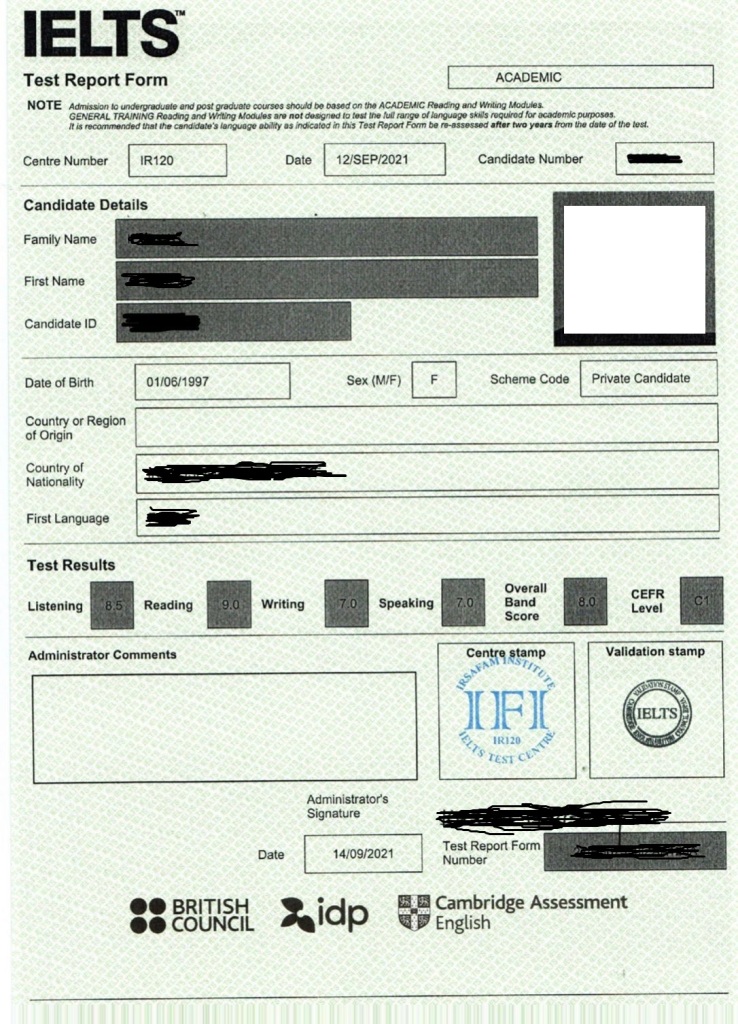IELTS (the International English Language Testing System) is one of the world’s most recognized English language proficiency exams for education, work, and/or migration purposes.
The exam is available in two modules – IELTS Academic and IELTS General Training (GT) where the Reading and Writing Task 1 tests are different:
- Reading has different difficulty levels and passage topics; GT: passages are formatted less cohesively (a collection of adverts and/or notices); time, types of questions, the number of passages, and the number of questions are the same
- Writing Task 1: for the academic module, you should write a report, based on a chart; for GT, you should write a letter
There’s no variation between the IELTS Academic and GT Listening and Speaking tests.
IELTS Infographics

*In the Writing section, you can start with either Task 1 or Task 2.
The total test time is 2 hours and 45 minutes + Speaking.
The Listening, Reading, and Writing sections of all IELTS tests are completed on the same day with no breaks in between. The Speaking section can be completed on the same or a different day.
Band scores are between 0 and 9 in 0.5 increments which are awarded for each section and then the Overall Band is rounded to the nearest whole or half band (you can calculate your overall score here). Each Overall Band meets a certain CEFR level that usually starts with B1 (4.0), the results below 4.0 will say ‘Below B1‘ on the TRF (Test Report Form). Some scores are shown as borderline (Pic.2). Institutions can judge what level is appropriate to their needs, e.g., if an institution requires a high degree of confidence that an applicant is at C1, they may set a requirement of 7.0, rather than 6.5 (Pic.1). However, be advised that on the Test Report Form (TRF), 5.0, 6.5, and 8.0 band scores meet CEFR B1, B2, and C1 respectively.
Also, bear in mind that there are minimum requirements for the overall score as well as for each component individually.
IELTS and the CEFR Infographics

Below are the websites that will help you drill all the sections for either module to get yourself well-prepared before taking the real test.
Do as much practice as possible and arrange yourself at least one or two mock exams (pretests) with all the sections with no breaks in between to replicate a real exam experience, taking into account the time frames for each section.
| ielts.org/for-test-takers/sample-test-questions cambridgeenglish.org/exams-and-tests/ielts/preparation/ ielts-mentor.com english-exam.org/IELTS/ ieltsbuddy.com ieltsliz.com ielts-up.com practicepteonline.com ieltsonlinetests.com (recent mock tests) cdielts.gelielts.com (familiarisation/mock test – L, R, W; 2h 30min) accioibis.app (L, R, W, & S assessment; not free, but there’s a one-day free trial) ielts.magoosh.com (not free, but there’s a one-week free trial) udemy.com/course/ielts-band-7-preparation-course (not free) |
IELTS for UKVI and IELTS Life Skills
IELTS for UKVI (UK Visas and Immigration) is a UK government-approved Secure English Language Test. There are three options: IELTS for UKVI Academic (usually for education purposes), IELTS for UKVI General Training (usually for work purposes), and IELTS Life Skills (family route: spouse, partner, or a parent of a dependent; sportsperson visa; indefinite leave to settle or citizenship). All three tests are accepted by the UK Visas and Immigration as proof of English proficiency. It is important to take the test at an official IELTS for UKVI location, which is approved by the UK Home Office, otherwise, it won’t be accepted. The results will be available after 5-7 days (depending on the centre). You can learn more about what type of visa you need and the level you have to apply for on the official website here: gov.uk/government/organisations/uk-visas-and-immigration.
*There’s no difference between IELTS and IELTS for UKVI (Academic or GT) in the test itself, only that IELTS for UKVI can be taken at certain centres (which are fewer than standard IELTS) that have a higher level of security (a candidate is recorded on a video camera), plus the application form is more detailed.
*If you need to take IELTS Life Skills, you should look for the IELTS for UKVI centre.
IELTS Life Skills is for those who need to demonstrate their English Speaking and Listening skills to get a certain visa. You will have to apply for CEFR A1, A2, or B1 level (depending on the visa you are applying for). The whole exam takes from 16 to 22 minutes. The results will be available after 3-7 days (depending on the centre), and you will get either a Pass or Fail. To get a Pass, test takers would need to get a 4.0+ in the Speaking and Listening sections (scores for Reading and Writing sections are ignored).
There’s another UK government-approved Secure English Language Test for work or study in the UK called PTE Academic UKVI, which is very similar to IELTS Life Skills.
To find an authorized Cambridge English examination centre, please go to ielts.org/book-a-test/find-a-test-location.
Other Important Points
- Now, with the IELTS One Skill Retake option rolling out globally, you can retake Listening, Reading, Writing, or Speaking (both IELTS Academic or GT) at any test centre where it is offered within 60 days of your of your test date. You can only complete one retake for each full IELTS test. You can learn more about it here.
- All IELTS modules are valid for two years and awarded by three partnering companies: British Council, IDP, and Cambridge English
- IELTS Academic and GT tests are the same cost, however, there’s no fixed price, as each centre sets its own price
- It’s not allowed to use a pen in the Listening and Reading tests; in the Writing test either can be used.
- It’s allowed to write on the Listening, Reading, and Writing question papers, as extra paper won’t be given for this
- There’s no Pass or Fail; a candidate gets a 0 only if they don’t attend the test
- There is no limit on sitting the test
- A candidate can make an enquiry about getting their skills (one or all four) remarked by sending an application to the centre where they sat the test. There is a charge for it which varies greatly between countries and centres, however, it will be refunded only if a candidate’s score increases for any section of the test. Remarking will be done by a senior examiner and will take between 2 to 21 days. You can download the enquiry on results form here.
- You can also request a breakdown of your exam results (e.g., if you got 7.0 for the Writing or Speaking section, but you don’t know why you were awarded that score, and would like to know what it is that’s holding you back from getting 7.5 or even 8.0) where you will be able to see the scores you got for each criteria that is assessed.

If you enquire the British Council (IGDisclosures@britishcouncil.org) to share the information that they have stored about you, they are legally obliged to do so according to the the General Data Protection Regulation (GDPR) is Europe’s new data privacy and security law. These applications usually take about around four weeks to be processed and you must apply for an enquiry into your results within six weeks of your test date. It’ll look something like this: - It’s allowed to write all tests in CAPITAL letters, however, it is advisory to use capitals only in the Listening and Reading tests, but not in the Writing one. It’s important to be consistent within the same section, not the whole test
- There’s no negative marking
- If a candidate is under 18, they will need their parent or guardian to book the test for them
- There’re no age restrictions to sit the test, however, it’s not recommended to take it for those who are under 16 y/o, as there are different Cambridge English tests (A2 Key / A2 Key for Schools, B1 Preliminary / B1 Preliminary for Schools, B2 First / B2 First for Schools, C1 Advanced, and C2 Proficiency) where you can apply for a certain level
- A candidate may be required to retake one or more IELTS components
- In the Writing section, word count differs from other exams
- Do not waste your money or risk your future by attempting to cheat; do not trust anyone trying to sell IELTS reports (certificates) or ‘leaked tasks and/or answers’.
All modules can be either taken on paper (paper-based test/PB/PBT) or computer (computer-delivered test/CD/CDT). The Speaking section is conducted in the same way for both options – always face-to-face with a certified IELTS examiner. With the paper-based option, results arrive after about 13 calendar days, whereas with the computer-based option the results arrive after 5-7 days. There are also more test dates available for taking the computer-based exam, however, there are fewer countries where you can take it.
During the Covid-19 pandemic outbreak, the exam can be taken online from home (IELTS Indicator). The results arrive within seven days (ieltsindicator.britishcouncil.org).
If you a specific question, you can submit an online enquiry at ielts.org/info-pages/contact-us/online-enquiry-form (*select Cambridge English as the IELTS organisation that you would like to send your enquiry to).
The exam, as well as the others, gets upgraded occasionally, therefore, before you start preparing to take it, make sure you won’t miss out on the latest updates.
You can learn more about the exam on its official websites: cambridgeenglish.org/exams-and-tests/ielts/ and ielts.org.
IELTS Test Report Form Sample
(Academic)

IELTS Test Report Form Sample
(Life Skills)


Dear Svitlana,
You might be aware that we have recently changed our domain name. We have moved our website from the old domain (https://www.ielts-exam.net) to a new domain (https://www.english-exam.org/IELTS/).
As the following links on your website will no longer work from December 2021 onwards, we would like to kindly ask you to update them to our new site.
We look forward to your continuing support.
LikeLiked by 1 person